Welcome to our ‘Science in Action’ page. Below you will find some of practical investigations and enquiries we have carried out across EYFS to Y6. You will also see some of the wider curriculum enrichment activities we have been engaging in, to help enhance our cultural capital in the world of Science…
Curriculum Enrichment Activities:
Y5 Guiseley Taster Day – A Journey to Mars
Today, Year 5 visited Guiseley High to take part in a taster day themed around a journey to Mars. As part of their day, they visited the Science Department to have a go at filtering some Mars water!





The Great Science Share for Schools 2024
This year, Tranmere have been engaging with the Great Science Share for Schools – a campaign that aims to inspire children and young people to ask, investigate and share scientific questions that are important to them. As part of this, they have been completing the ‘penny drop’ investigation in class and creating sustainable science poetry for homework.
Check out Puffins Class page to see and example of how our pupils go on… https://www.tranmerepark.leeds.sch.uk/classes/puffins-zclasses/puffins-the-great-science-share-for-schools/










Ingleborough Hall Y4 Residential
As part of Y4’s residential at Ingleborough Hall, all pupils went caving. Renowned for their limestone landscapes, the caves offer a range of features such as stalactites, stalagmites, flowstones, fossils and underground rivers – bringing their ‘Rocks’ unit to life.
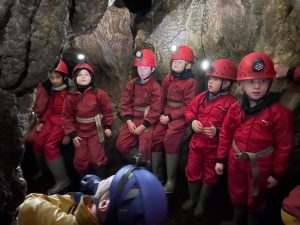
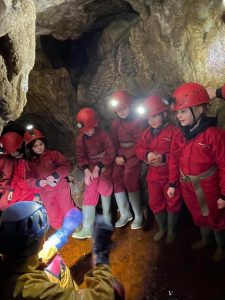

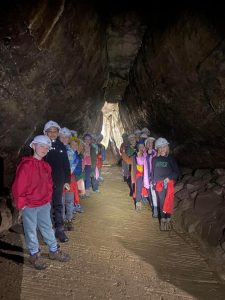

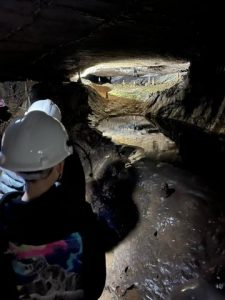
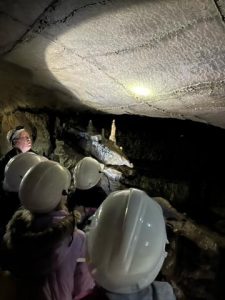
British Science Week
This week was British Science week, and this year’s theme was all about ‘time’. All pupils across school have engaged in a range of different activities, investigations and experiments centered around this topic. Follow the link below to find out more…
https://www.tranmerepark.leeds.sch.uk/classes/woodpeckers-news/british-science-week-2/
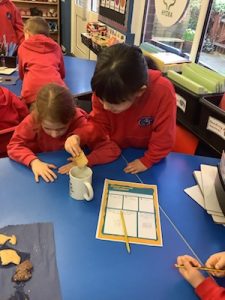
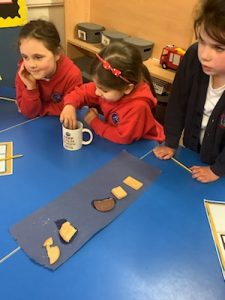
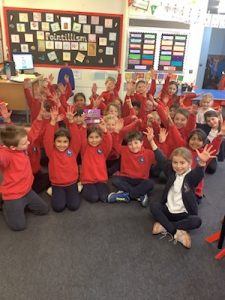
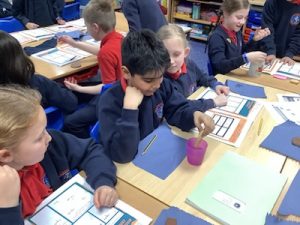
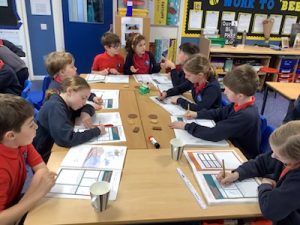
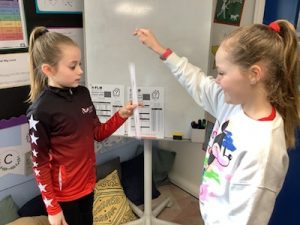
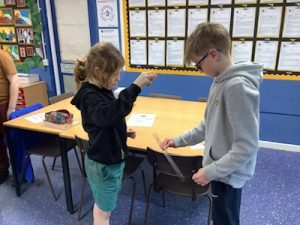
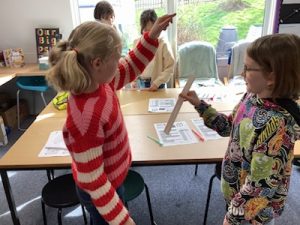
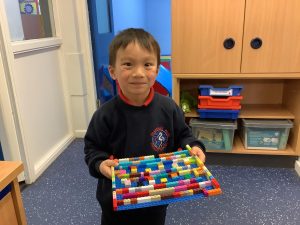
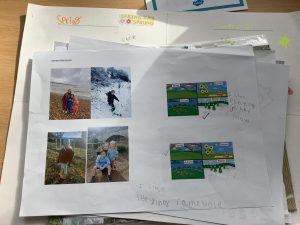
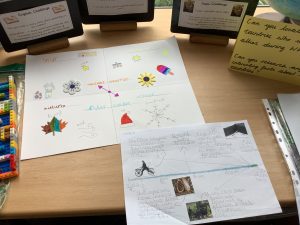
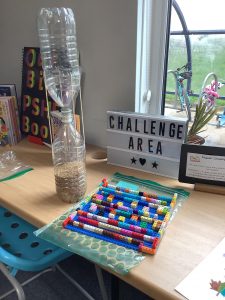
Mars Day
To celebrate Mars Day today, pupils across school, from EYFS to Y6, have taken part in a range of different fun and engaging activities centered around the terrestrial planet! From taking part in STEM interactive live lessons and quizzes, to creating their own rockets, Mars Rovers (edible of course!), aliens, watercolour and bubble paintings and, attempting to program their own Scratch characters to land on Mars…
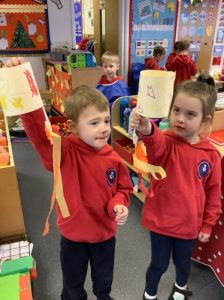
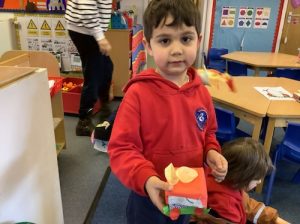
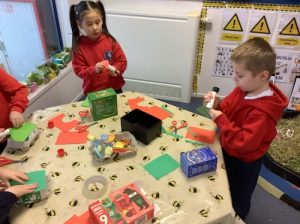
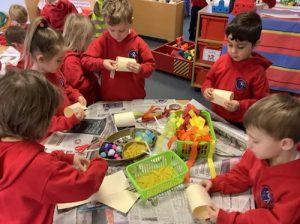
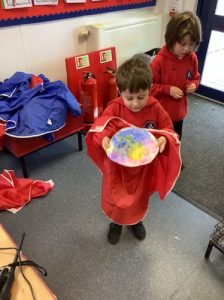
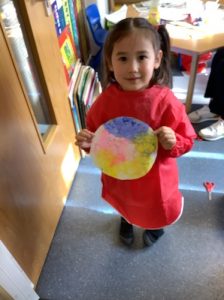
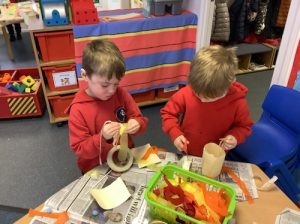
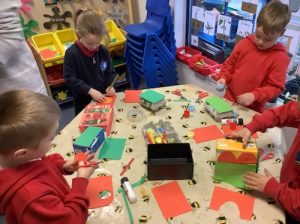
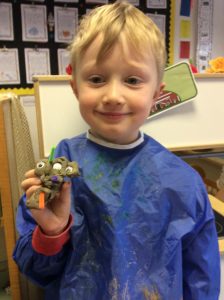
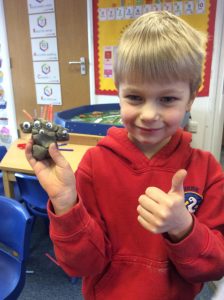
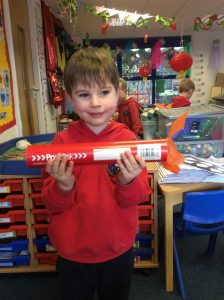
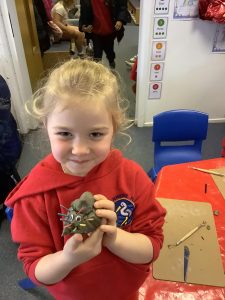
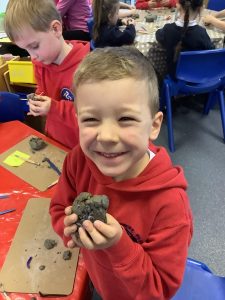
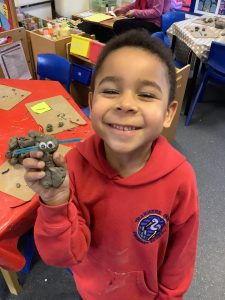
Chicks in KS1
To enhance and enrich the childrens’ learning within their current ‘Animals Including Humans’ science unit, KS1 have had a very special delivery this week! 20 eggs were delivered in an incubator with news that they would soon be hatching! This morning the children arrived at school to discover 2 chicks had already hatched, and by the end of the day they had a whopping 7!
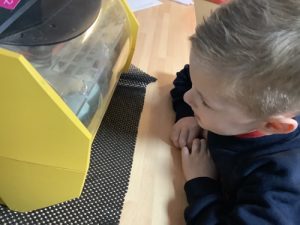
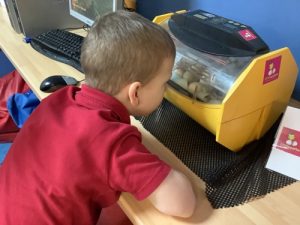
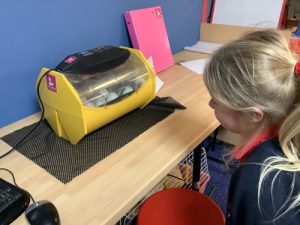
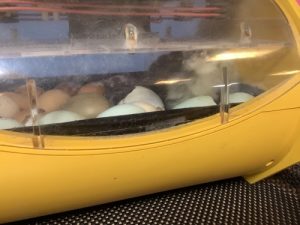
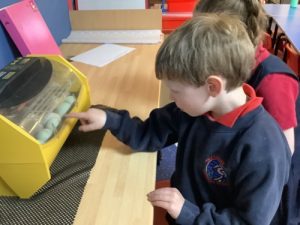
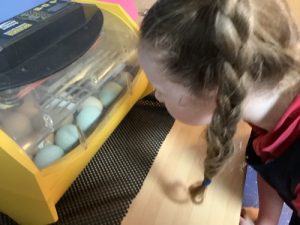
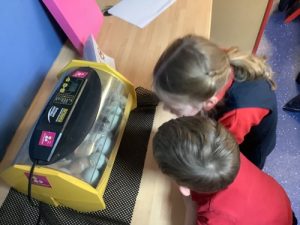
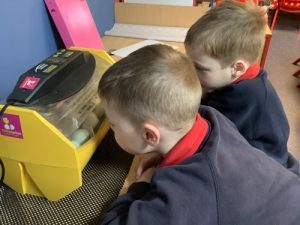
International Day of Girls and Women in Science (Activities)
To celebrate International Day of Girls and Women in Science, pupils have spent some time learning about important women from the industry. They have then independently researched selected Girls and Women of which they made detailed, vibrant and informative posters and biographies about. Pupils have also spent some time learning about the different job roles within the field of science (zoologists, biologists, and astronomers – to name a few!), and many have been inspired to think about these roles as potential future careers!
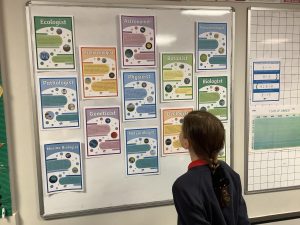
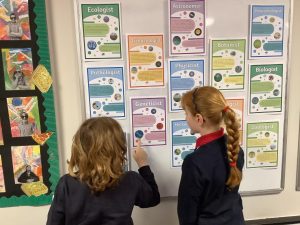
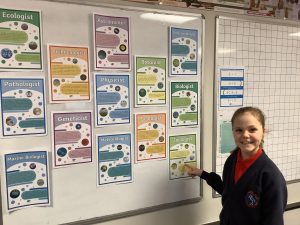
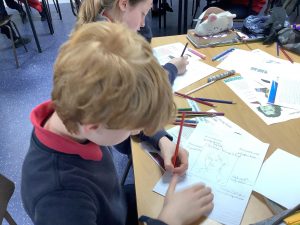
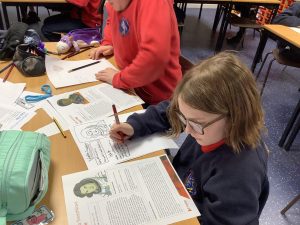
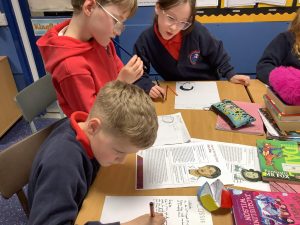
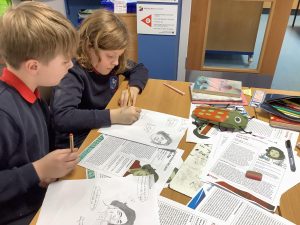
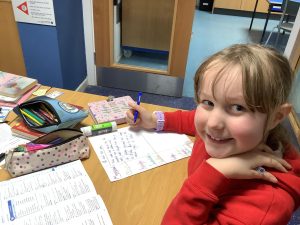
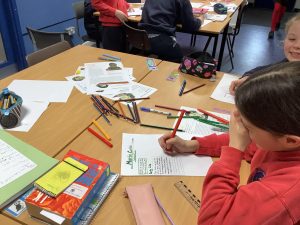
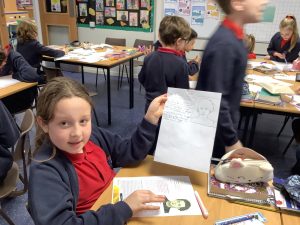
International Day of Girls and Women in Science (Reading Areas)
To help celebrate International Girls and and Women in Science Day, reading areas across school have been filled with books that highlight inspirational Girls and Women in this field, both past and present.
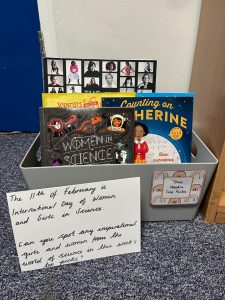

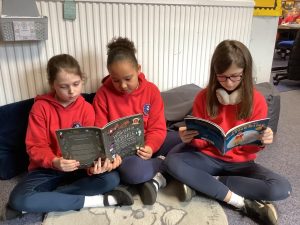
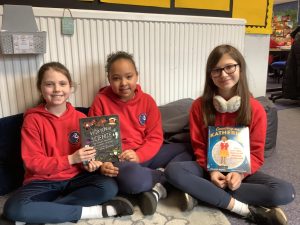
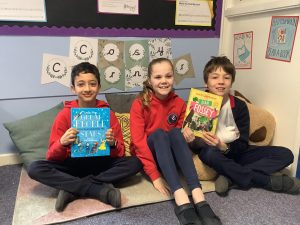
Spaceship Earth Show
This morning, Puffins took part in an interactive Spaceship Earth Show presented by The STEM Hub. The children saw what it would be like to be launched into our solar system and what we use satellites for.

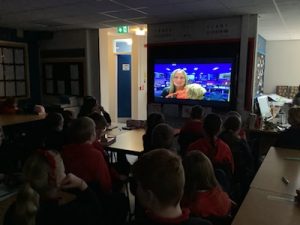
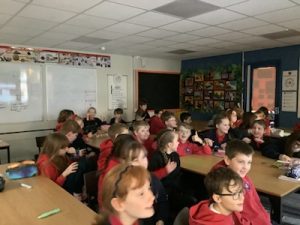
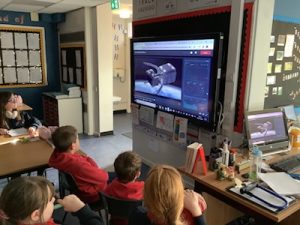
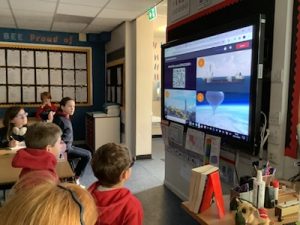
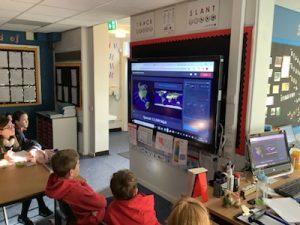
World Soil Day
Follow the link below to find out why Puffins have been joining in with The Country Trust’s request to ‘plant their pants’ for World Soil Day…
https://www.tranmerepark.leeds.sch.uk/classes/puffins-zclasses/puffins-science-plant-your-pants-for-world-soil-day/
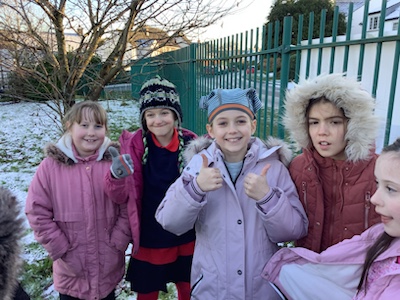
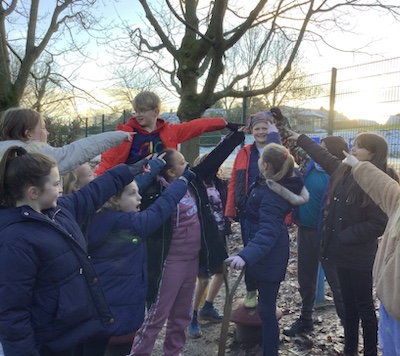
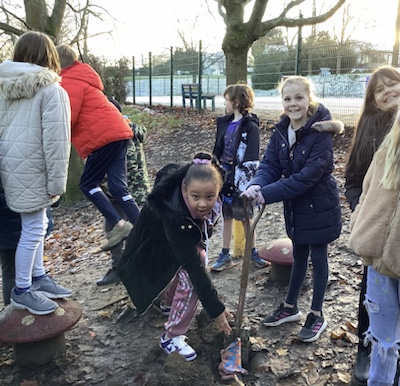
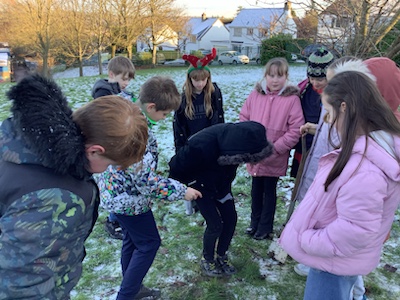
Science in the Curriculum – Click the title for more.
Falcons – Nature Treasure Hunt
As part of our ‘Living Things and their Habitats’ Science topic, we took part in a Nature Treasure Hunt. In groups, we had a checklist of things to find. Once we found them, we had to take a picture of it to show it was real! We really enjoyed being outside, getting muddy and seeing …
Homework – W/C 10.6.24 – The Great Science Share for Schools
The Great Science Share for Schools is a campaign that aims to inspire children to ask, investigate and share scientific questions that are important to them. This Tuesday (11th), is their annual spotlight day, which aims to promote their campaign and this year, they have chosen the theme of ‘sustainable science’ to help with this. …
Herons – Topic Entry Point/Science
In Herons, we have been looking at different seeds and bulbs. The children were given 11 different seeds to investigate which they spent time looking at and feeling. In groups of 3 or 4, they were told to sort them (with no further instruction). All of the groups ordered them by size. We then ordered …
Eagles Entry Point-We Are What We Eat
To start our new topic ‘We are what we eat’, Eagles have been exploring seeds. We tried to sort them before we knew what they were and then put them into three groups: vegetable seeds, fruit seeds and flower seeds. After comparing the different seeds we planted some in seed trays. We planted onions, courgettes, …
Periscopes – UKS2
To finish our topic on Light, UKS2 learnt how to create a periscope. This involved understanding the science behind reflected light and how this knowledge can be utilised.
UKS2: Light
Today, we manipulated reflection (and our knowledge around light travelling in a straight line) to shine a beam on a target, avoiding ‘obstacles’ along the way, without them noticing.
Which biscuit is the best ‘dunker’?!
If, like me, you wake up at night crying out for the answer to the question above, then worry no longer. At Tranmere, we care about the quality of everyone’s sleep so have set out to solve the conundrum once and for all. UKS2 have spent the day testing which biscuit (a custard cream, chocolate …
Homework W/C 11.3.24 – British Science Week
This week is British Science Week and this year’s theme is ‘Time’. To celebrate this, our homework this week will centre around this topic. Please select one task (or more!) from the grid attached. We would love to see what you get up to, so please do send in any pictures, videos, posters, …
Red Kites Science – Heating and Cooling
Red Kites carried out an experiment to find out what temperature chocolate melts at. They worked in small groups, allocating roles to each other, measuring temperatures and the times it took for chocolate to melt in water of different temperatures. They eventually discovered that chocolate melts at 25 degrees Celsius, which is how it feels …
Falcons Science – Heating and Cooling
Falcons carried out an experiment to try to find out what temperature chocolate melts at. They worked in small groups, allocating roles to each other and measuring temperatures and times it took for chocolate to melt in water of different temperatures. They eventually discovered that chocolate melts at 25 degrees Celsius, which is how it …
Red Kites Science – Non-Newtonian Fluids
Red Kites explored cornflour goop which is a Non-Newtonian Fluid. In other words, it has different properties and behaves differently to other fluids (Newtonian fluids). When you mix cornflour and water together it creates a suspension, sometimes behaving like a solid and sometimes behaving like a liquid and it’s fun to explore, if a little …
WW2 themed Science: booby traps
Today, the Doves classroom looked a little different; it was blacked out, the tables were arranged in a chaotic juxtaposition and booby traps (trip wires and pressure pads) were set out for the children to try and avoid. This brought our electricty topic to a close. Next up, light.
How Eggciting!
Yesterday KS1 had a very special delivery! 20 eggs were delivered to us in an incubator with news that they would soon be hatching! This morning we had 2 chicks and by the end of the day we had a whopping 7! The children are so eggcited about their arrival and can’t wait for cuddles …
Falcons Science – Non-Newtonian Fluids
Falcons made and explored cornflour goop which is a Non-Newtonion fluid. In other words, it has different properties and behaves differently to other fluids (Newtonian fluids). When you mix cornflour and water together it creates a suspension, sometimes behaving like a solid and sometimes behaving like a liquid and it’s fun to explore, if a …
Science – Lovely Liquids?
We investigated the effects of liquids on teeth by testing orange juice, cola, vinegar and water on hard boiled eggs. The composition of the shell of a hard boiled egg is similar to that of the surface of our teeth so we put a hard boiled egg into each of these liquids and left them …
Science – The Digestive System
Using a plastic bag to represent the stomach and a leg from a pair of tights to represent the intestines, Red Kites class learnt about the journey of food through the digestive system. The food journey demonstration went from the mouth right to the other end of the digestive system. It was a fun way …
Science – The Digestive System
Using a plastic bag to represent the stomach and a leg from a pair of tights to represent the intestines, Falcon class learnt about the journey of food through the digestive system. The food journey demonstration went from the mouth right to the other end of the digestive system. It was a fun way to …
Falcons – Head vs Height Science Investigation
This week in Science, we conducted an investigation! The question we looked at was ‘Does head circumference help us to predict a person’s height?’ We made our predictions and then soon set about trying to find the answer. We used metre sticks and tape measures to find out the measurements for children in the class …
Exercise and our body
In Science, we have challenged the children to see how regular exercise affects their mood, self-esteem, sleep and health. Today, we modelled a basic circuit that could be completed in the home (sit ups, press ups, burpees, plank, bear crawls and step ups). The children have recorded their baseline figures and are going to retest …
The composition of blood – UKS2
Today, in science, we have learnt about plasma, red blood cells, white blood cells and platelets. Having defined the terms and the functions they serve, we created a representation of our blood using red and white hammer beads, a chocolate sprinkle, water and custard powder. We tried to ensure that our 200ml solution was comprised …
Falcons – Amount of Sugar Science Experiment
As part of our Science topic, we talked about food labels and how we know what is in what we are in eating and drinking. We then looked at various different drinks that all have ranging levels of sugar in them. Firstly, we had to guess in groups how much sugar was in each drink …
Science in Woodpeckers
Have a look at the pictures below from our science lesson on comparing the amount of sugar in different drinks. Apologies if we have a returned a sticky child today!
The circulatory system
Today, we became blood cells and journeyed around our circulatory system. During our journey, we entered each of the four chambers of the heart before being pumped to either the body or the lungs to complete the gaseous exchange.
Heart and lung dissection – Year 5/6
Today, we were joined by Doctor Khanna, who kindly volunteered his expertise and led a dissection. The children learnt about the chambers of the heart and the purpose of: veins, arteries, the trachea, the bronchi, the lungs and the alveoli. Further to this, on two of the samples, we were able to spot the voice …
Reversible Changes – 5/6 Science
This week, we have created Alien Soup (as you do) in order to demonstrate how materials can be separated. We examined what a solution was and discussed irreversible changes learnt in 3/4 (burning, baking, rusting etc). We then began creating our ‘soup’: water, sand, paper clips, salt and rice. The children were challenged with understanding …
Sexual reproduction in flowering plants – dissecting Lilies.
On Thursday, the Puffins studied the male and female structures of flowering plants. We dissected a Lily and identified the pistil/carpal (stigma, style and ovary), the stamen (anther and filament), the sepals and the petals. One or two groups also thought that they had identified an egg (ovule) in the ovaries.
Sexual reproduction in flowering plants – dissecting Lilies.
On Friday, the Doves studied the male and female structures of flowering plants. We dissected a Lily and identified the pistil (stigma, style and ovary), the stamen (anther and filament), the sepals and the petals. One or two groups also thought that they had identified an egg (ovule) in the ovaries.
Puffins – British Science Week
As the majority of us were in Lockerbie during British Science Week, we decided that we still wanted to celebrate it, just at a later date! We read a book called ‘The Most Important Animal of All’ and learnt about lots of different animals, including krill, beavers and elephants. We discussed why they could be classed …
Falcons’ Fossils
As part of our new topic in science, we have been learning about how fossils are formed and found in sedimentary rock. Surprisingly, despite real terms spending being at the highest it’s ever been, there remains a paucity of paleontological equipment here at Tranmere Park so we improvised with bread and shrimps and bananas.
Woodpeckers – British Science Week
This week in Woodpeckers, we’ve had lots of fun celebrating British Science Week. The theme this year is ‘connections’ which we’ve explored through the book ‘ The Most Important Animal of All’. This book introduces children to the concept of ecosystems, demonstrating just how important the connections between organisms are in keeping our planet running …